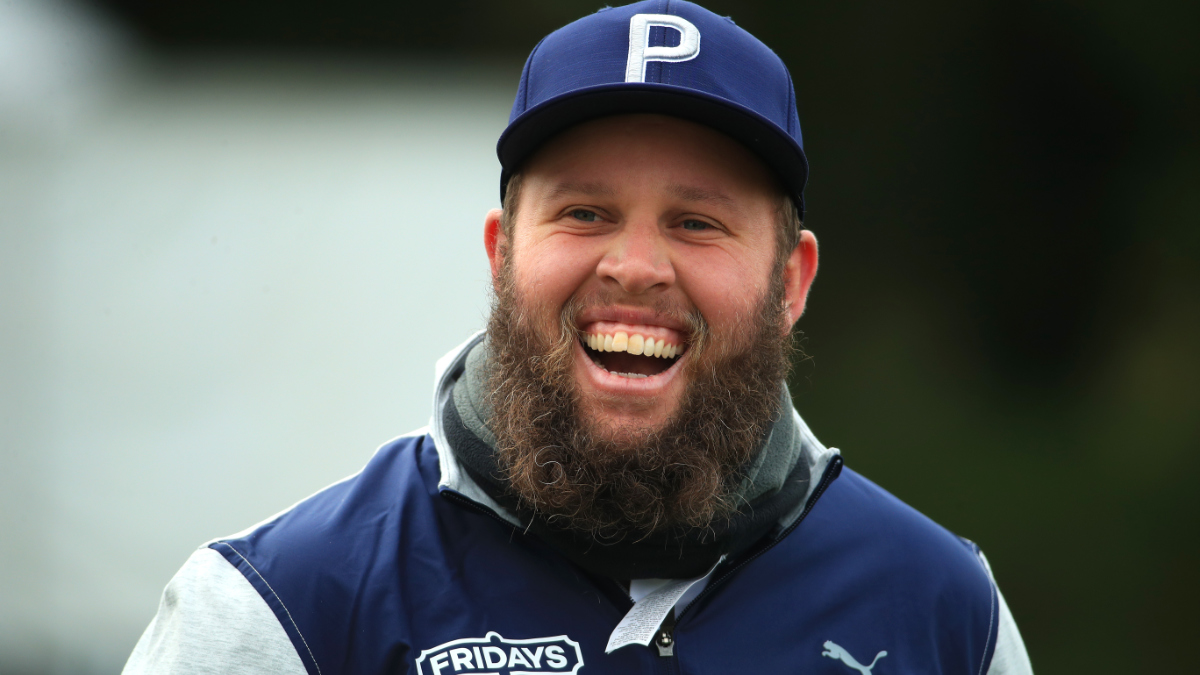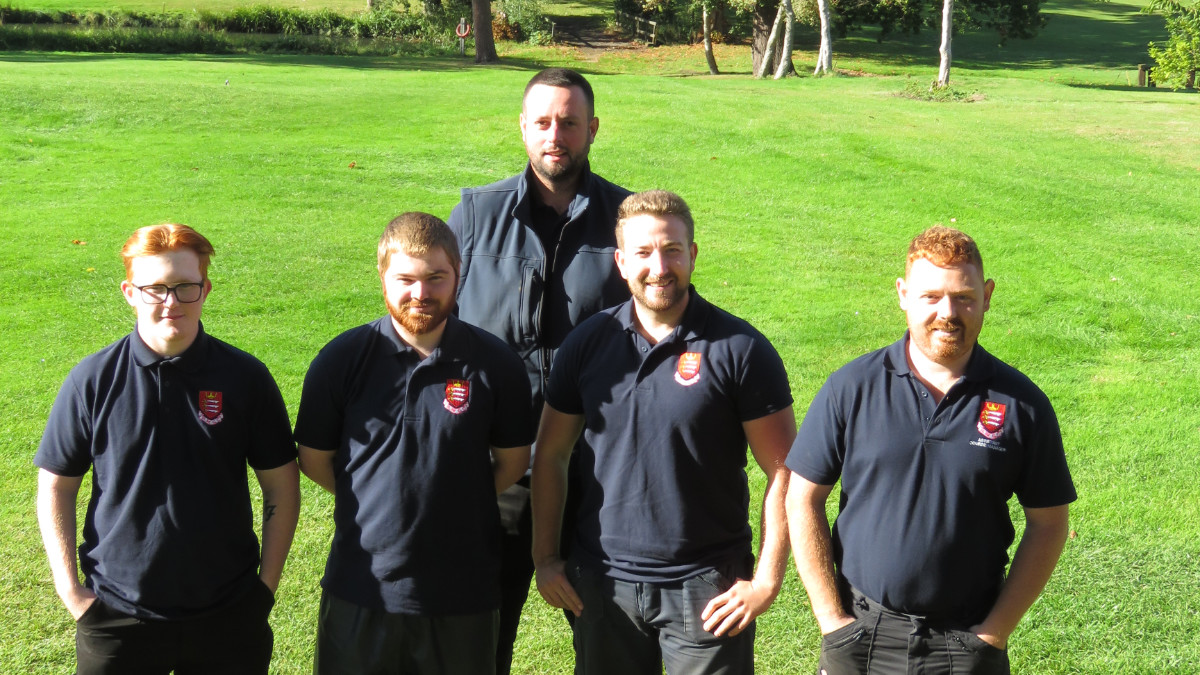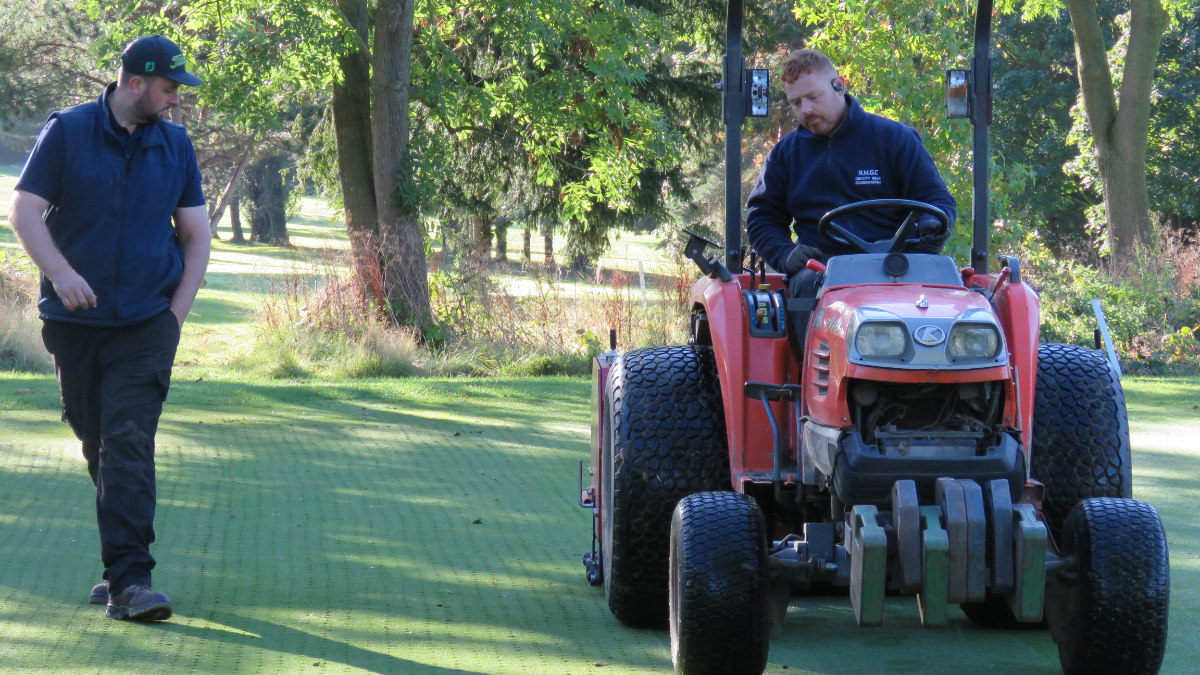- Homepage
- News and Features
- Beef on greenkeeping
Beef on greenkeeping
Beef on greenkeeping

Andrew Johnston is one of the most recognisable figures on the European Tour. With his bushy beard and unmistakeable physique, ‘Beef’ is among the most popular players around.
Despite relocating to Portugal, where the weather is more favourable towards winter practice, Beef has retained his membership at North Middlesex and is close friends with head greenkeeper Ben O’Sullivan.
Greenkeeper International recently spoke to him on the phone about his appreciation for the work of greenkeepers everywhere, and how he’s fascinated by what it takes to maintain a course – even if he’d rather stick to playing.
Who doesn’t love a bit of Beef at Christmas?
GI: You spend your life out on the golf course, so what’s your awareness of the work of greenkeepers?
Beef: It’s a brutal job, man. I’ve seen it over the last four or five years at North Mids and it is brutal. What Ben and the team have done with the funds they have has been really good and they’re working really hard.
GI: So would you say you’re pretty switched on about what it takes to maintain a course?
Beef: Before Ben joined North Mids we were looking at the course and I said to the club that it wasn’t good enough, we needed to sort it out. Only when you start asking questions and digging around do you realise how much goes into it.
Ben was at Finchley at the time and we wanted him to come over because he’s been [at North Middlesex] since he was a kid and I feel like if he has a love for the place, it was going to work out really good.
The greenkeepers work really long hours and it’s hard. I speak to him a lot and he’s always out on the golf course, especially in the summer when they’ve got golf days and competitions and things like that. You see him up at four o’clock in the morning when sprinklers break and he’s got to go out and fix them or things like at. It’s like he’s on call 24/7.
GI: Coming up through the England Golf system you will have played a lot of courses around the UK, but what is the understanding of elite level players regarding the work of greenkeepers? Is there an awareness of what it takes to prepare a course for you guys?
Beef: I don’t think so, no. I’m only finding things out by asking questions. I had no idea how much the teams work for months before tournaments or shut courses weeks before and then how they have greenkeepers sent from all over the country to work on » that tournament for that week. Ben was telling me how he was going to one of the tournaments to work and I asked what he meant. He told me you can apply to volunteer for events and I had no idea about that, that’s crazy.

GI: The fact you have a greenkeeper for a mate, do you have their side more than the average player?
Beef: 100%. I’ve seen what Ben does at North Mids and how some members will complain if, say, the course is shut for a week for maintenance or they’ve hollowtined and sanded the greens again. They say, ‘why does he keep doing that?’, that’s the one I hear a lot. ‘Oh, they’re hollowtining again,’ things like that. They’ve got no idea how to maintain good greens for us to play on.
Members have got to understand and give a little bit, especially the last couple of years where it’s been such a long, cold winter for six, seven months with no growth and it was freezing in April and people are coming up to him and saying the course is crap. I’m saying to Ben, I’ve played good courses and they’re equally as bad, so it’s not just North Mids. Other golf courses all struggle if it’s not hot enough for the grass to grow. That must be really frustrating for Ben and I really take his side because there’s nothing you can really do.
GI: In recent years, the withdrawal of chemicals and other products alongside increasing costs and a desire to do what’s morally right, has led to greenkeepers pursuing a more sustainable approach, to the benefit of wildlife and the wider environment. Would you be comfortable accepting a course that wasn’t pristine but that was doing its bit for the environment?
Beef: Yeah, 100%. That doesn’t define a golf course.
People compare our UK courses to others in America, where they’ve got 300 days of sunshine. But I think people need to come to reality and get away from thinking that bad chemicals are a good thing for us and for nature. We’ve all got to accept that.
GI: What makes a golf course stand out to you?
Beef: Definition. When it looks nice as you walk up to a hole and it stands out, I think that’s because they’ve got nice definition on them. Whether that’s just the way the rough is shaped or the fairway is shaped or even the way a fairway is cut, just things like that.
I think sometimes it’s good to be a little different. I know a couple of years ago when Ben first came over, he cut the fairways in a diamond pattern that we’d never seen – they’d been striped since I was a kid – and we were all buzzing about it, saying it was wicked because it completely changed the definition of the golf course. Little things like that are brilliant.
GI: Is speed important to you on a golf green, or what are you looking for?
Beef: First, if they’re going to be quick then they’d better be a good surface. I think golf is about having a consistent surface, not necessarily getting them to 12 or 13, but if they run at 10 consistently, that’s better. It becomes a bit crazy at golf courses where all of a sudden they go from slow to really fast and then slow again.
Also, you can get them quick, but I don’t think it’s possible to maintain it. We played Valderrama the other week and I stayed around there for a couple of days. On the Tuesday [after the event] I hit a few practice putts and straight away they were so much slower than from when we played it on the Sunday or during the week. You can’t maintain those kind of speeds so they hadn’t touched them for two days afterwards. It’s about being realistic and consistency is key.
GI: When you are playing a tournament, do you actively speak to the greenkeepers to shake their hand or speak to them for a little bit of behind‑the‑scenes information?
Beef: Sometimes if we’re practicing, we’ll see them out on the golf course, especially if I’m teeing off late, and we’ll have a quick chat and say hi, stuff like that. But then I just let them get on with what they’ve got to do. They’re busy and they’ve been there a long time, so I just try and stay away and let them do their thing and crack on.
GI: Do you ever fancy having a go at greenkeeping?
Beef: You know what, I think it’s one of those things that from a distance looks great because you get to sit on a mower and cut greens or whatever. But after being friends with Ben for so long and speaking to him all the time about it, it puts me off to be honest. I know the hard work he does and although it’s one of those jobs where it looks great, it’s hard work, it really is. And I don’t think greenkeepers get enough appreciation from the members sometimes.
'For the first three weeks I thought I had made the biggest mistake ever'
How Ben O'Sullivan and the team brought North Middlesex back from the brink

We all know that the right greenkeeping team can quite literally save a golf club, but in the last four years the management and members at North Middlesex have also come to that realisation.
The club, on the outskirts of London, has a famous member – Andrew ‘Beef’ Johnston of bearded European Tour fame – but by 2017 there were just 170 other playing members and the club was close to shutting its doors for good.
The course had suffered from a lack of investment and the previous head greenkeeper had resigned some time before, in part due to the strain on his mental health. The fractured team that remained was without leadership and completely unengaged.
An old friend of Beef’s was working as deputy head greenkeeper at Finchley, just three miles away. He was Ben O’Sullivan and he just happened to also be a long‑term member at North Middlesex. It’s not often that a deputy has to think twice about making the step up to a fully‑fledged course manager role, but Ben was well aware of the troubles at North Middlesex. Caught between heart and head, he went along to meet the team and have a look around.
“It was a nightmare and there was no work being done on the course,” said Ben, 32. “I had a look in the shed and I was stunned by how bad it was. There was dew left on the greens every morning, none of the machinery worked and » although they had four staff, one was on long‑term sick due to a work-related issue. It was all just crazy stuff.”
Despite the club’s poor financial state, following that visit Ben had the confidence to tell them honestly that substantial investment was required if they were to turn things around. Perhaps the club was more inclined to listen due to his years of membership, but they took on board what he said and went one step further, by offering him the head greenkeeper role.
“I started on 22 January 2018 and for the first three weeks I thought I had made the biggest mistake ever, things were that bad,” said Ben. “The attitude of the team was disastrous. I’ll never forget the first job I gave to one of them was handcutting the tees. For me that’s completely normal as it means during winter you aren’t driving a heavy machine onto wet ground. He gave me such a bad look that I asked, ‘Is there an issue with you handcutting tees?’ and he replied, ‘No, I just think it’s ridiculous’. Imagine that attitude – I’m your new boss and you’re telling me the task I’ve given you is ridiculous!
“Then towards the end of the week, one of them rang in sick. I found out he had over 20 days sick the previous year, which set alarm bells ringing.
“Two of them kept phoning in sick, then when they did come in, they didn’t seem to want to do any work, so in the end it was agreed that they would leave.”
Within just a few weeks of his first tenure as a head greenkeeper, Ben was forced into making difficult decisions – hardly the ideal scenario when you finally achieve your life’s ambition. Fortunately, the club committed to investing £200,000 in machinery over five years, which would help make up for time lost fixing broken equipment and go some way towards offsetting the loss of staff.
The course had suffered from years of poor management, with different voices and opinions regarding how it should be maintained, leading to contrasting approaches and practices.
The greens suffered from thick layers of black thatch as no fine turf maintenance had been done in the absence of a head greenkeeper and the rest of the course was in a similar sorry state. With plenty of competition in the surrounding area, the club was bleeding golfers.
Ben prioritised the putting surfaces and brought in AGS agronomist Jamie Bennett, who completed a soil analysis. Thatch layers were about 2 inches and incredibly unhealthy so, despite it being May and the start of the playing season, heavy coring had to take place. The topdressing was changed to pure sand to aid drainage and throughout 2018 the team focussed on getting the greens in better condition.

“At first the golfers weren’t happy that we were aerating throughout spring and summer, but towards the back of 2018, I started to see a slight improvement in consistency and drainage,” » said Ben, who also had to apply a significant range of products in the first few months in the job. “Although I told them it was a five‑year project, I could show the club the improvements and told them that if they wanted that to continue and expand to other parts of the course, we would need more staff.
“Kevin Taylor had worked at North Middlesex previously but left due to the poor morale among the team. I asked him to come back and he has been amazing since he returned.”
With the greens improving, next on Ben’s ticklist was the aged irrigation system. The dry summer of 2018 had highlighted how obsolete the system was and Ben would frequently arrive at the club at 2am to do a manual cycle, with it taking nine hours to do all 18 greens, before they could even think about irrigating tees and approaches.
“I said look, you need to get a new system and it’s going to cost £25,000,” explained Ben. “I’m asking so much of the committee and to be fair they said ‘all right, we’ll take a punt’. They began to trust what we were saying because they could see the process and how things were improving.
“Now we’ve got our machines, a good irrigation system, our greens programme and I said in 2019 let me start to work on our tees. We put our greens programme straight onto the tees and they slowly started to improve. But the club was on a really big high and you could see that things were getting better.”
A further £32,000 was invested in improving some of the 116‑year‑old club’s bunkers and, as word got around about the restoration of the course, membership and visitor numbers began to steadily climb.
Ben said: “In 2017 we were nearly going bust, which is one of the reasons why I didn’t want to take the job. We only had 170 members and then the Beast from the East hit us hard. Most clubs do well in summer and save money for a rainy day but we didn’t even have that and the club was even thinking of asking the members to lend us some money. But we made it through and membership has been steadily improving to the point that we now have 440 members and are asking for a joining fee.
“We’ve even got to the point where we have a fairway programme for the first time ever, where we do drainage work twice a year and apply wetting agents every month, which is around £12,000 alone, in addition to putting granular feeds on all our fairways. Before I arrived, the club committee hadn’t heard about any of these things.”
The greenkeeping team has benefitted from the club’s change in fortunes and morale is much higher, especially as it is due to be expanded to six full‑time staff in the near future.
“For the first time, all my team have an interest and really like the job,” said Ben. “Now everyone comes up with ideas and shows an interest
in what we’re doing around the course, which tells me they care.
“I got the club to provide them lunch every day and we eat it in the clubhouse, which is great because when the members see them they give compliments about their hard work. I’ve also lobbied to get them bonuses at Christmas because it inspires them to push on to try and get another next year.
“They’re getting praise, they’re getting bonuses, people are thankful to them and then they take an interest and want to progress, which benefits the club. Those words, ‘thank you’ go a long way, but they never got it before, whereas now the morale of the club is through the roof. We had our end of season do recently and whereas in the past you wouldn’t get three people at it because no one liked each other, we had 22 people there last Monday from across all the departments. It was such a good laugh and they never had that before. People now enjoy coming to work.
“When I say this place was in turmoil, you just wouldn’t believe it. The greens were shockingly bad, the machinery was neglected, it was crazy. Looking back on it from where we are now, I never thought this would happen in a million years. But it shows what you can do when you invest in the course and in the staff themselves. I’ve got such a great bunch of lads, I’m very lucky.”
Membership numbers are up to capacity and the additional revenue that brings has been reinvested in the course as Ben has opened effective lines of dialogue with management that means when he asks for investment they understand not only why he is requesting it, but the team has also earned their respect and so are more likely to be listened to. But what about North Middlesex’s most famous member? How has he perceived the changes taking place at the club?
“Beef loves North Middlesex because he’s been here as long as I have and it was his dad’s club before him,” said Ben. “We had him down for our captain’s weekend and he shot a 64 around here.
“He said to me that it’s amazing what we’ve done to the greens and how we’ve really turned the place around. He said it’s the first time he’s ever seen definition like it on the course.
“I know he’s my friend but I could see that he really meant it, which was fantastic.”
Author

Karl Hansell
Karl has been head of communications for BIGGA since March 2016. His duties include editing the monthly Greenkeeper International magazine, in addition to other communications activities for the association.
